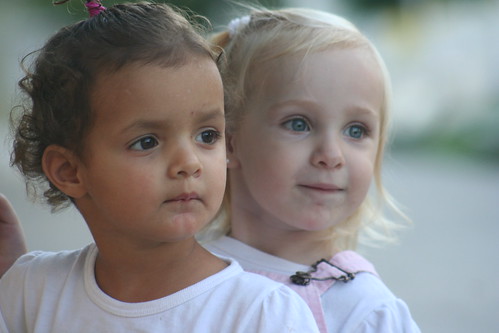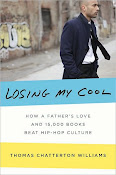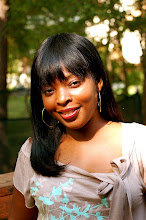
By MELANIE EDWARDS
There is this thing in the Latino culture where your parents, or other relatives, will often say “terms of endearment” that if were said in the English language would be down-right insulting and offensive.
Examples:
Spanish term/phrase: Esta gordita!
English Translation: She's fat!
Spanish term/phrase: Negrita
English Translation: Dark-skinned girl
SpanglishBaby posted about this issue. It was part of their Ask an Expert series and a reader asked, “Will my daughter be hurt by “negative” Spanish terms of endearment?” She wrote:
“My four month old son is easily entertained and smiles instantly at one’s playful interactions. However, my 22 month old daughter will not be playful until she feels comfortable with someone…The other day he told her (in a playful manner) ‘tu hermano es más bonito que tú porque el se ríe’.”
Translation? “Your brother is prettier than you because he smiles.”
I’ve never really given any of this much thought, but could certainly relate to the reader’s remarks and question. I experienced this myself and have many times been called “gorda” and “negrita.“ You somehow get used to it I guess. Did growing up hearing such comments affect me? I have no clue, honestly. My lack of confidence at times may partly be because of that or a myriad of other things that have happened in my life. Who knows.
In reality, no harm is meant when people say such things. It’s always in a playful manner and said “with love.” Growing up around it and in that culture, you know that to be true. But, now that I have a daughter and enough negative images out there to compete with, I’m certainly more aware of how hearing such things could cause some harm.
I’m not normally one to be overly cautious of how I say things. My husband, his family, my family, and our friends, all pretty much joke in the same manner and don’t hold back. It’s just known that you have to take the jokes to survive in our circle. In fact, if we don’t make fun of you, we probably don’t like you. This probably seems backwards, but the fact is that energy is spent on those we care for.
But, I think with our daughter, there will be a very distinct line between jokes and jokes that involve self-image. In today’s society, and with the culture she’s growing up in, it’s something my husband and I have to really consider.
My favorite part of the expert’s advice to the reader who posed the question:
“When your children are older and better able to understand what is being said, the terms will provide you with an excellent “teachable moment” for discussing cross-cultural communication, which is one of the 21st century skills necessary for success in the global economy!“
Discussing cultural differences and how she should understand and even embrace many of them, is something that I strive to teach my daughter.
Any thoughts? Did you grow up hearing “terms of endearment” that were more hurtful than loving?
Photo Credit: Loligallardo
About our MyBrownBaby contributor:
Melanie Edwards is a Modern Mami™. As a latina working mother, she provides an honest depiction of the everyday humor and drama in the life of today's wife, mother and woman from a Latina perspective. She often blogs about the special concerns working mothers have in attempting to achieve a work-life balance. Melanie has been married six years and has a 3-year-old daughter.






























Wow great question. I have a cousin that grew up and still is called Negra. She says it doesn't bother her and she calls others the same thing. I don't know.
ReplyDeleteMy oldest boy is adopted and Black Vietnamese. I tried calling him the "N" word for a while in a pleasant sweet voice thinking I could take the sting out of the word, but I stopped in short time. I just didn't feel comfortable. And that I raised him in Vermont he never experience the kind of words you are mentioning here because I'm sure my family would have nickname him something bad.
I believe words can hurt more than a slap. And if there is a difference in cultural communication I don't know. I will be watching the comments here eargerly to hear more.
Oh my two boys are now men. I keep forgetting. ha ha
Jo Ann Hernandez
BronzeWord Latino Authors
http://authorslatino.com/wordpress
Will be posting this article to twitter on @LatinoBookNews If you have a twitter name I wish you would send it to me. I'd love for you to be aware of all the times I post your articles on twitter. Thank you
Hi Jo Ann. So glad you found my article interesting. You can find me on twitter as @modernmami. Thanks for the comment.
ReplyDeleteWow! Great article!
ReplyDeleteI definitely agree that certain elements in our children's lives must serve as "teachable moments" by which we help them to understand their environment. Words can definitely hurt, and sometimes the wounds they create take many years to heal. I am from Jamaica, and our Caribbean culture, poking fun is a rite of passage! Still, some of the statements I feel are inappropriate, and I make no qualms of asking family members not to use them. For example, statements such as "Stay out of the sun, look how black yu get, gyal!" It's all in good humor, but not for my daughters who will attend predominately white schools. They will likely develop their own healthy complexes that they will overcome and be better for in time, so no need to add to the mix at home (this is my humble opinion).
Fortunately our children have parents who are paying attention, and we will continue to do our best to help them make sense of the culture of poking fun.
I remember hearing coffee will make you black numerous times when I would tease my grandparents and ask to be poured a cup too. That hasn't harmed me in any way though.
ReplyDeleteWhat I do remember most were references to my "kinky" hair. Words like cuckleburrel (I think I spelled that right)and phrases like "the kitchen" still irk me a little. Those are what hurt to this day.
Hope that's not too off topic. BTW great post!
Like Execumama, I am from a Jamaican family and, yes, teasing is a large part of our culture (especially poking fun at girl children). Although I knew this, it still hurt to be called fried egg (because my chest didn't measure up to the C and D cups on the rest of my female family members) and nappy-head (because my hair was thicker and coarser compared to everyone else) or spotty-spotty because I had acne versus the clear-skin everyone else had. To this day, I am sensitive about my looks. now, I just became a mommy to a girl and I am not looking forward bringing her around my family. thankfully, we live far from them, but she will meet them one day and I don't want her to be subjected to their scrutiny. I already get question over the phone about the "quality" of her hair and I just roll my eyes. I plan to help her develop a thick skin and a sharp tongue so she can be ready for them!
ReplyDeleteWow, this hit home. I have two daughters, ages 10 & 4. My 10 yr old is darker then my 4 yr old and myself but she has the same complexion as her father (my husband). My MIL often called her "La negrita" and I couldn't stand it. My daughter asked me what it meant but b/c she is darker then her two siblings, I didn't want her feeling bad but I told her anyway. I didn't say it was a bad thing, I said it was a beautiful thing b/c it is. I love the fact that she has the same complexion as her father; I often wished I had her "natural tan" plenty of times and still do. The main reason why I never liked that term was b/c my MIL always called her own daughter that name but it was to tease her so that is why I don't like it. I rather have people call her "nena", girl in spanish.. instead of blanquita (white girl) or negrita.
ReplyDeleteGood article. I definately feel that words even in jest can hurt. I have a son and a daughter and I am mindful of the possible negative effects that could be initiated by my husband and I as well as from family members. I have had to kindly let family members know, where I draw the line when it comes to statements made to my children. They could only respect my feelings as a mother.
ReplyDelete